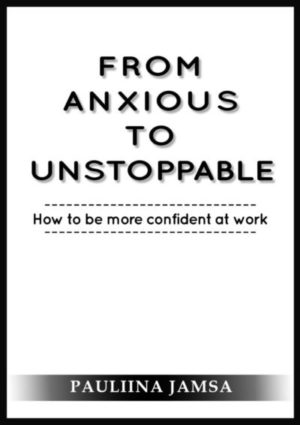Hiding anxiety is easy. We cover it under jokes, arrogance or cheerful appearance while deep inside we’re crying for help. We use Netflix, food and alcohol to distract us so we don’t have to truly deal with our real emotions, that emptiness inside.
But you know what – you’re not alone. What you see on social media and at work is not real. It’s like filters we use on Instagram to cover our imperfections. That person who seems to be living a perfect life online or is popular at work can struggle with insecurities like you.
You can feel disconnected and lonely even if you’re surrounded by a crowd of laughing people.
Haven’t we seen this with amazing people we’ve lost?
My life’s not perfect either. I struggle. I distract myself. But I never lose hope.
And so shouldn’t you.
Life will get better. It always does.
6 ways how to calm anxiety at work discreetly

Having anxiety can still unfortunately be a stigma at work. We don’t want to be labelled. We don’t want to be a topic of discussion near the coffee machines.
We definitely don’t want pity.
But instead of negative distractions, there are few positive things you can do to calm anxiety at work without anyone noticing. There will be situations that will trigger it, such as conflict, being excluded, feeling overwhelmed with all the tasks, having to do a presentation, bad feedback from boss or rejection.
Next time when you notice you’re starting to tear up and it’s hard to breathe, try these 6 simple things that I’ve used to calm myself down:
1. Get up and go for a walk
Movement is the best way to stop your thoughts. Get up, grab a paper and pen and go for a walk, preferably outside if you can. If not, walk to the kitchen or toilets.
But doesn’t it look weird if I leave right in the middle of meeting or review?
It doesn’t have to: you can for example press the start button on your phone so the screen lights up, say that you absolutely must take it and leave the room faking a phone call.
Isn’t that unethical? No.
When you’re in a high state of anxiety, staying in the situation does more harm than good to your workmates and yourself. There’s nothing positive that you can say or do when your “lizard brain” takes over, fighting for your survival. You can yell, cry or say something hurtful you’ll regret.
If you stay it’ll be disruptive and bad for your boss or your colleagues. Remember: you can always stay 10 min later at work that day to balance it out.
Write down right now: how are you going to excuse yourself? Who’s calling you? What will you say? Where will you go?
2. Put on a calming, short meditation on Spotify, YouTube or Headspace
As you’re at work, you can’t stay away for a long time, but there are short meditations you can play on your phone. Try to carry your headphones always with you so you can easily listen to them.
For example, I search for “5 min meditation anxiety” and then listen to it while I’m walking. It’s recommended to sit down – and you can – but I’ve found listening to it combined with the movement and fresh air much more effective to calm anxiety down. Try both and see what works for you.
If you have a lunch hour, great! Then select a bit longer meditation and spend more time on the tips below.
Write down right now: Which meditation you’ll use?
Preparation is everything. Test various ones beforehand to see which one suits you best. Have it in your favourites so it’s easy to find.
3. Breathe slowly
When you’re in a stressful situation or a state of anxiety, your breathing gets quicker. This stops enough oxygen getting into your brain and you’ll end up gasping for more air which will increase your anxiety even more.
There’s a reason why smoking tends to calm people down – it’s not the nicotine per se, but slow inhaling and exhaling.
If you absolutely can’t get away from the situation, this WILL help you out. Discreetly inhale and count in 10. Exhale and count in 10. Repeat until you’ll feel better.
Do the same even if you’ve left the room. If you’ve got your guided meditation on, usually they’ll advice you on breathing.
Write down right now: What will I do next time I’m feeling anxious? How will my breathing be?
Practice breathing at home with a stop watch so it’ll become a habit.
4. Journaling: write down how you’re feeling and what you can do about the situation
Getting your feelings out of your system is essential and journaling has been by far the best tool to do this as you can be as honest as you can. Second is speaking with a coach or friends who’ll understand you.
Take your journal or piece of paper, sit down and write down the following questions and answer them:
What makes me feel anxious and upset?
It’s very important not to ask “why”, because then you’ll write answers like: my boss is being mean or similar. Using “what” makes you go beyond that. E.g.
- my boss says that I haven’t delivered, but it’s not fair: I have hit my deadlines.
- I have been given new responsibilities and tasks, but my workload is already huge. I don’t know how to cope.
- My colleagues went for a lunch without me. I feel excluded, like no one wants me around.
What 3 things can I do improve this right now and what makes it a good idea?
Nothing is not an answer: there’s always something you can do. E.g.
- I’ll go back and highlight 3 positive things I’ve done at work to my boss in a calm way so there will be something positive in my review.
- I’ll write a list of main tasks I need to do, select top 3 and do them today. It will get me started.
- After the next meeting I’ll ask people next to me if they also feel like some coffee and say that they can join me or I’ll bring them some. That will create goodwill even if they say no.
Now select one of them that feels best and do it.
You can also do this in the meeting without leaving the room if you have to: write it down in your notes.
Here are more tips how you can use journaling to stop overthinking
5. Have a special picture folder on your phone with your favourite funny / inspirational memes, pictures and memories that make you smile
Distraction, but a positive one. When you feel anxious, take your phone and scroll down your pictures in your folder. It will take you to the happy place and you’ll feel more calm.
Take action: set up a folder right now and add 5 pictures.
6. Reach out to a friend, kind colleague, coach or share your thoughts on private online group
It’s ok not to be ok. Journaling is great, but sometimes you’ll need to talk about it with people who listen, care and understand what you’re going through.
You’re not alone. Just make sure that after letting it out, it won’t turn into a pityparty. I see this especially on online groups where people feel sorry for you, say negative things like “there’s nothing you can do. You can’t trust people” or tell you to get over it.
Choose well and end your conversation with a positive note, using the journaling tactic: what options you have and what you’ll do next. That’s where an anxiety or life coach can be very helpful.
Write down: Who can I speak to? Which group could I join?
Calm your anxiety step by step
Whoever you are, you’ll come across situations in life where you’ll feel overwhelmed, stressed and anxious. These are the ways that I’ve personally used to cope with them and I hope they’ll help you too.
Start with one of these tips that speaks to you most and try it for a week to see if it works. Then add others step by step.
If I got over my anxiety so can you.
Never forget you’re amazing x
Pauliina
Ps. If you know anyone who this could help, please do share. Anxiety is something we rarely talk about and often suffer silently. If the right person sees this, it can make a difference. Thank you!

